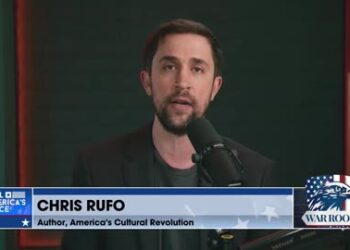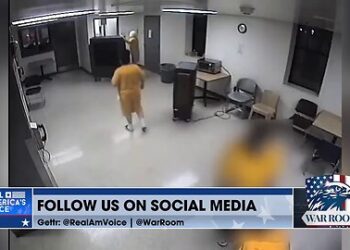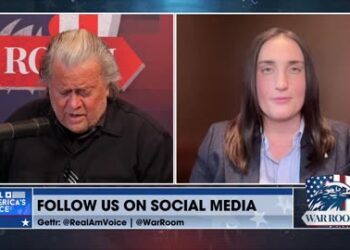In the recent conversation on “The War Room,” Jeff Clark and Dave Brat discussed significant legal and political developments, particularly the Supreme Court’s ruling on presidential immunity and its implications for the January 6th investigations.
Clark emphasized the importance of reading the 119-page Supreme Court opinion during his discussion.
He urged listeners to undertake this task as a constitutional duty, suggesting that understanding the court’s reasoning firsthand was crucial amidst widespread misinformation and media misrepresentation of the ruling’s implications.
“Look, we have a long set of opinions, a total of 119 pages. But you know, for anyone in the War Room audience, it’s easy. They should read it, if they can. That’s what I would task them with, it’s their constitutional duty, and they’re not going to find this insanity in the pages of the actual majority opinion by Chief Justice Roberts,” Clark told Brat.
HERE IT IS- READ IT:
Clark began his remarks by addressing what he perceived as a critical moment in legal history, likening the Supreme Court’s decision to “the shot heard around the world” for the Deep State and administrative apparatus. He emphasized that the ruling clarified the president’s authority under Article 2 of the Constitution to investigate and prosecute as necessary, countering what he described as a previously cozy setup within the Justice Department dominated by career officials favoring Democrats.
Clark criticized the media’s response to the ruling, accusing them of misrepresenting its implications and fabricating scenarios like the Seal Team 6 hypothetical to discredit the decision. He argued that such misinformation aimed to undermine the Constitution’s principles rather than uphold them, challenging citizens to read the court’s opinion and fulfill their “constitutional duty” to understand its true meaning.
Regarding the specifics of the Supreme Court’s ruling, Clark detailed that it affirmed civil and absolute criminal immunity for the president concerning core constitutional and delegated powers. He stressed that this was not a new law but a reaffirmation of constitutional principles often neglected in recent decades, particularly during what he termed as periods of post-constitutionalism dating back to the Progressive Era.
Central to the discussion was the “take care clause,” found in Article II, Section 3 of the U.S. Constitution, which mandates that the President must “take care that the laws be faithfully executed.” Clark underscored that this duty is fundamental to the separation of powers and ensures that the President acts within the legal framework established by the Constitution and Congress.
The conversation pivoted to the January 6th committee’s efforts to scrutinize President Trump’s actions on that day. Clark defended Trump’s speech as an official act protected under the Supreme Court’s framework. He dismissed attempts to categorize it as unofficial campaigning, asserting it was a legitimate exercise of presidential duties to address public concerns peacefully and patriotically.
Clark encouraged listeners to engage politically through organizations like Citizens for Renewing America, advocating for actions that uphold constitutional principles amidst what he portrayed as ongoing challenges to constitutional governance.
Clark’s analysis on “The War Room” underscored his belief in defending presidential authority, challenging media narratives, and fostering public engagement in constitutional matters amidst contemporary political controversies.
For more context, watch the full WarRoom segment:




